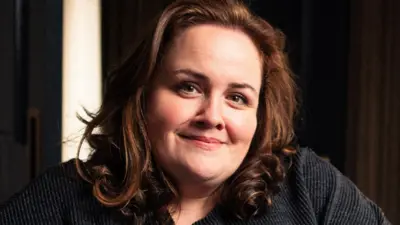We've updated our Privacy and Cookies Policy
We've made some important changes to our Privacy and Cookies Policy and we want you to know what this means for you and your data.
Covid: Women should 'keep taking the pill' amid jab clot fear
- By Eva Lantos
- BBC Wales news
Image source, Lara Hill
Women are being urged not to stop taking contraceptive pills after blood clots fears were sparked by the Covid vaccine rollout.
Health officials have said the pill runs a risk of blood clots while defending the safety of the Oxford-AstraZeneca vaccine.
Some women have claimed they were not told of risks by GPs, and have called for better contraceptive services.
The NHS said there was "a very low risk" of blood clots.
Dr Jane Dickson, consultant in reproductive healthcare at Aneurin Bevan University Health Board, said: "The last thing we want is for women to stop their pill and have a pill scare so we have a mass of unplanned pregnancies.
"I wouldn't recommend anyone stops their pill without a discussion with their health professional first."
A review by the Medicines and Healthcare products Regulatory Agency (MHRA) found that by the end of March 79 people had suffered rare blood clots after having the AstraZeneca vaccination in the UK - 19 of whom had died.
This was out of 20 million administered doses - giving a risk of about four in 1,000,000 of developing a blood clot and one in 1,000,000 of dying.
Image source, Getty Images
Health experts, including the head of Wales' vaccine rollout, have insisted the vaccine is safe, while explaining other medicines such as the contraceptive pill carry risks of blood clots.
The US, South Africa and European Union have also temporarily paused the rollout of the Johnson & Johnson Covid jab after reports of rare blood clotting.
It has sparked concerns by some women taking the pill, who have claimed on social media they were not warned about potential blood clot side effects by their GP.
Image source, Getty Images
The combined pill was prescribed 180,628 times in Wales in 2019-20.
Dr Dickson, vice-president of the Faculty of Sexual and Reproductive Healthcare, said the risk of developing a blood clot while taking the combined pill was relatively low.
"If a woman wasn't taking the pill, her risk of blood clots would be about two in 10,000, if she is taking the pill it will be between five and 10 in 10,000," she said.
'I wasn't told the risks'
Image source, Lara Hill
Seven years ago, Lara Hill was put on the pill to deal with heavy and painful periods.
"I wasn't told about the risks and actually only found out about them when the discourse surrounding Covid vaccines emerged," she said.
Lara, from Llangorse, Powys, said while the side effects of the Covid jab had been well publicised, it was unfair many women were having to make choices without all the information and it was not being talked about.
"I understand why there is concern about the vaccine because obviously any new vaccine is going to be controversial and the risk has to be taken into account," she said.
"It feels unfair that so many young women are offered the pill without much discussion of the side effects and yet, when something as crucially important as a vaccine is made available, the side effects are taken more seriously despite the fact the risk is lower."
Lara said the medical and media attention in response to the AstraZeneca blood clot fears, compared to the lack of discussion about pill alternatives, was unfair.
"So many women are taking the pill and have been for a very long time, but no-one has brought it up or made a conversation with it like what has happened with the vaccine."
Dr Dickson said the reason for the pill's popularity was because it allowed more control, and women like the "familiarity" of the combined contraceptive pill.
However, she said the fact the vaccine was new, along with the efforts of those trying to reassure the public, is why it had received so much attention.
"The AstraZeneca vaccine is a new thing and this particular sort of blood clot that we're seeing, nobody knows quite how the blood clot is formed.
"It's extremely rare and it's a different sort of clot that we see associated with combined contraception.
"Those people trying to reassure about the safety of the AstraZeneca vaccine have relied on common everyday risks related to blood clots like being on the pill and are and are saying all this is much higher risk than the AstraZeneca vaccine."
Public Health Wales said everyone, including people taking the pill, should take up the offer to have a Covid-19 vaccine and urged people not to delay it to wait for a specific type of vaccine.
A spokesman added: "As a precaution, people should seek prompt medical advice if they experience any of the following symptoms from four days to four weeks after Covid-19 vaccination: A new severe headache which gets worse when lying down or bending over and sometimes with other symptoms, unexplained pinprick bruising or bleeding, breathlessness, chest pain, swelling of a leg or persistent abdominal pain."
AstraZeneca vaccine: Denmark stops rollout completely
It is the first European country to fully withdraw the jab over possible links to rare blood clots.
Top Stories
Features & Analysis
Most read
Content is not available








